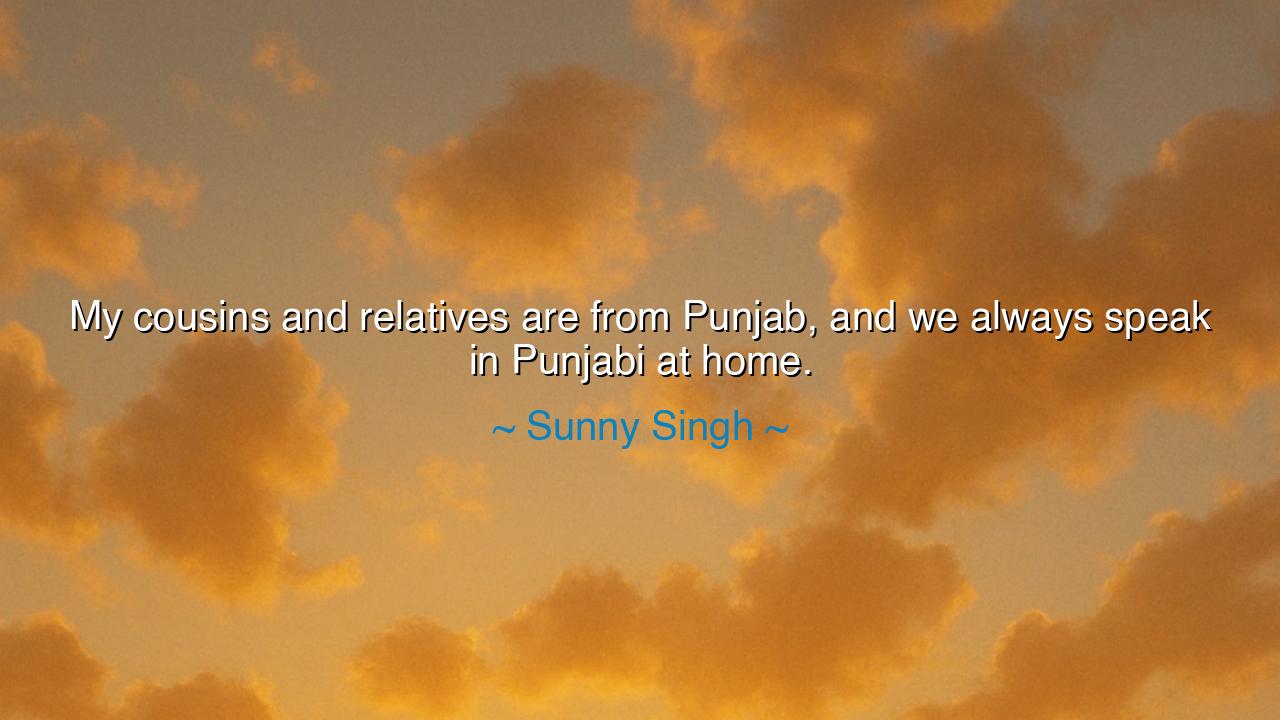
My cousins and relatives are from Punjab, and we always speak in






In the words of Sunny Singh, the actor who proudly honors his roots, there lies a truth older than empires and deeper than blood: “My cousins and relatives are from Punjab, and we always speak in Punjabi at home.” To some, this may seem a simple statement — a mention of language and kinship — yet to the discerning ear, it resounds with the echo of heritage, belonging, and identity. For within the rhythm of one’s mother tongue lies the memory of generations, the unbroken thread that binds the heart of the present to the soul of the past.
When Singh speaks of speaking Punjabi at home, he does not merely describe a habit; he affirms a living covenant between the self and one’s ancestors. The home becomes not just a dwelling, but a sanctuary — a sacred space where culture is preserved in sound, where words are not merely tools of communication but vessels of ancestral memory. The ancient philosophers understood this truth well. In the temples of Greece and the courts of India alike, the language of one’s people was seen as the breath of the nation’s soul. To lose it was to lose the rhythm of one’s history, the melody of one’s identity.
In the land of Punjab, where the five rivers once nourished poets, warriors, and farmers alike, language carries the fragrance of courage and joy. The Punjabi tongue, bold and musical, carries the laughter of festivals, the sorrow of separation, and the faith of centuries. When Sunny Singh declares that his family still speaks it, he becomes not just a son of Punjab, but a guardian of heritage — one who keeps alive the voice of his forebears amidst the noise of modernity. This act of continuity is an ancient virtue, one celebrated in every civilization that has fought to preserve its spirit through time’s passage.
Consider the story of the Jewish people, who for centuries wandered in exile yet never let the Hebrew tongue die. In whispered prayers, in lullabies, in sacred texts, their language lived — waiting patiently until the day it could rise again as the voice of a reborn nation. So too with families like Singh’s, who keep their ancestral speech alive in daily life, turning simple conversation into resistance against forgetting. Every word spoken in Punjabi at the dinner table, every story shared in the old tongue, is a quiet act of remembrance — an affirmation that roots, once watered, will not wither.
There is also in his statement a lesson in balance. For while Sunny Singh works and thrives in a modern, global world, he carries within him the music of home. This harmony between progress and tradition is the mark of wisdom. The ancients taught that to walk strongly into the future, one must walk with the footsteps of the past. Like a tree that grows tall only when its roots are deep, a person finds greatness not by abandoning where they come from, but by letting it ground their journey.
The lesson of Sunny Singh’s words is clear: cherish the language of your origin. Let it not fade beneath the weight of convenience or modernity. Teach it to your children, speak it with pride, and carry it like a flame that lights your home. For in every language lies a universe — a way of seeing, feeling, and belonging that no translation can fully capture. To lose it is to lose a part of yourself; to preserve it is to preserve the voice of your ancestors whispering through time.
So, let us take his example to heart. Speak the words your grandparents spoke. Sing the songs that carried your people through storms. Whether your tongue is Punjabi, Tamil, Arabic, Greek, or Navajo — it is the thread that weaves your soul into the tapestry of your lineage. As Sunny Singh reminds us, a home is not made of walls and roofs alone; it is made of the words spoken within it. And when those words are the same ones that echoed through the hearts of your forefathers, then your home becomes more than a dwelling — it becomes a temple of memory, a living bridge between past and future.






AAdministratorAdministrator
Welcome, honored guests. Please leave a comment, we will respond soon